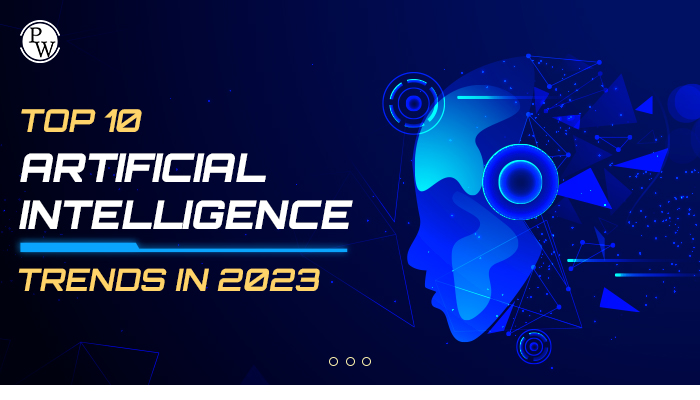Artificial Intelligence (AI) is continuously evolving, and several exciting trends are shaping its future in 2021. Let’s explore some of the most important trends that can revolutionize various industries. AI continues to evolve and impact various industries.
The integration of modern technologies has brought about significant changes in workplaces. To become future-ready, you must ace these skills from industry experts at PW IOI.
Artificial Intelligence Trends
Integrating AI with Cloud solutions, IT systems, and other domains is set to revolutionize how we work and interact with technology. As these trends gain momentum, organizations must
prioritize ethical AI practices and foster a data-driven culture to unlock AI’s potential fully.
Greater Cloud and AI Collaboration:
AI is expected to play a significant role in the widespread adoption of Cloud Solutions. By deploying AI, organizations can efficiently manage vast amounts of data and monitor cloud resources effectively. This collaboration between AI and Cloud technology promises improved business data management and insights.
AI Solutions for IT:
In 2021, we will witness a surge in AI solutions specifically designed for IT. These AI-powered systems can detect and fix common IT issues independently, reducing downtime and allowing IT teams to focus on more complex projects. The automation provided by AI will enhance IT processes and streamline operations.
AIOps Becomes More Popular:
As IT systems grow in complexity, AIOps solutions are gaining popularity. Combining multiple monitoring disciplines like application, infrastructure, and networking, AIOps enables IT operations to make better decisions and improve key processes. It empowers cross-team collaboration and enhances the management of IT operations.
AI to Structure Unstructured Data:
In the future, AI will help structure unstructured data using natural language processing and machine learning. This technology will enable Robotic Process Automation (RPA) to automate transactional activities even with unstructured data. It expands the capabilities of RPA and enhances its usage in various industries.
AI Talent Demand Continues:
There is a persistent gap in AI talent, which poses a challenge in adopting AI in 2021. Organizations realize the importance of addressing this gap and are focusing on providing access to AI knowledge and training for a broader group of people. The aim is to foster a data-driven culture and support AI integration in the working environment.
Large-Scale AI Adoption in the IT Industry:
The adoption of AI within the IT industry is on the rise. In 2021, organizations are expected to use AI on a large scale, leading to real-time returns on investment. AI-driven solutions will be implemented in production, resulting in significant pay-offs for organizations.
AI Ethics in the Spotlight:
AI ethics will take center stage as AI plays an increasingly critical role in various sectors. Organizations will prioritize transparency in data usage and algorithm fairness. Addressing ethical concerns will be vital to maintain trust and ensure responsible AI development.
Augmented Processes with AI:
AI and data science will fuel innovation and automation in 2021. Companies will optimize their business and development processes using AI-driven insights. Organizations will promote improved collaboration and collective intelligence by fostering a data-driven culture.
Focus on Explainable AI:
Expanditability will be a major focus as more data regulations come into play. Understanding and articulating how AI models make predictions will build trust. AI-driven capabilities like automated speech recognition in customer care centers will enhance quality feedback and compliance checks.
The Rise of AI in Cybersecurity: New Challenges and Opportunities
One concerning aspect of AI is its potential misuse by hackers, who can significantly leverage its capabilities to speed up their attacks. According to a report by McKinsey, these malicious actors can now carry out end-to-end attacks in just days or even hours rather than weeks. As AI becomes more prevalent in various industries, critical infrastructure, including essential services like power and water supply, may be threatened by hacking activities.
Smaller organizations with less robust security measures will also remain vulnerable. However, with the increasing cybersecurity risks, new career opportunities are emerging in the field of information security. Specialists are needed to deploy and manage AI-driven security solutions to safeguard organizations against cyber threats.
Recommended Course
Frequently Asked Questions
Q1. What does the future hold for Artificial Intelligence in 2022?
Ans. As we witness the rapid growth of Artificial Intelligence, it’s clear that its future is full of promise. AI has become an integral part of various industries, poised to be one of the most groundbreaking technologies ever created.
Q2. Why is Artificial Intelligence gaining popularity today?
Ans. AI is a combination of different technologies that work together to solve business problems and automate tasks. With trends like cloud computing, big data, voice recognition, and more coming into play, AI is capturing more attention than ever.
Q3. What can we expect in terms of future AI trends?
Ans. Looking ahead, we can anticipate further developments in AI trends. Emerging areas like cybersecurity and intelligent process automation complement ongoing trends like AI in Healthcare, autonomous vehicles, and facial recognition.
Q4. What is the most advanced form of AI?
Ans. The most advanced AI technology to date is Deep Learning. Scientists teach robots by providing them with diverse datasets. Using this data, computers learn and make decisions, tackle complex problems, and perform tasks autonomously. Deep Learning represents a significant milestone in AI’s capabilities.
Q5.What is the current booming technology?
Ans. Artificial Intelligence is growing in power and is expected to make even more astounding advancements by 2023. These advancements include machine learning, natural language processing, and image recognition.
Recommended Reads
Data Science Interview Questions and Answers
Data Science Internship Programs






